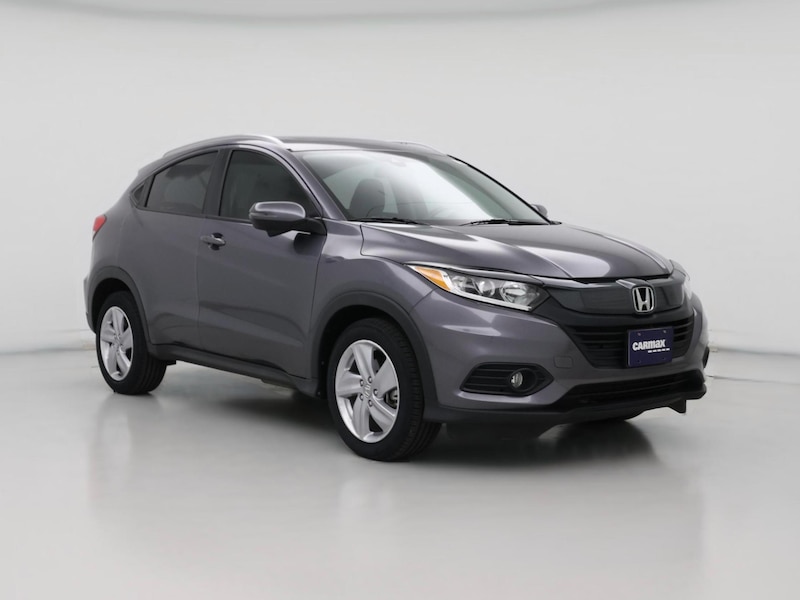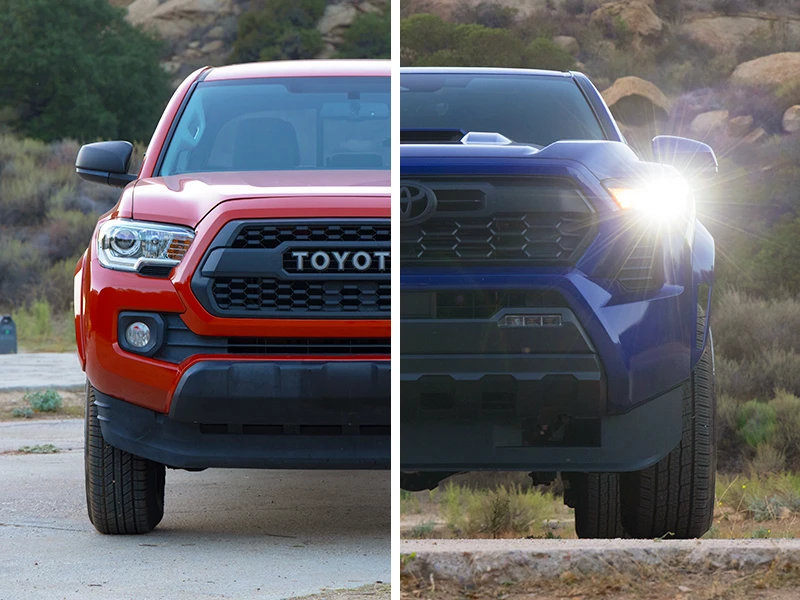
Take your pick of these impressive SUVs.
Honda has a great range of SUVs, from the compact HR-V and crossover CR-V to the rugged Passport and powerful Pilot. Each of these vehicles provides something different, but all can carry you in calm, confident style. Whether you're looking for a companion for the commute or you want a vehicle with off-road prowess, there's a Honda SUV out there for you.
If you're still considering other brands, take a look at these comparisons of Chevrolet SUVs and Toyota SUVs.
Honda's SUV lineup has evolved over the years. The CR-V has been around since 1995 but was fully redesigned for its fifth generation in 2017. The large, three-row Honda Pilot came out in 2003 and was redesigned in 2016, followed by a facelift in 2019. In 2016, the HR-V joined the lineup as a smaller option for those who still want SUV practicality. In 2019, the Passport joined the party as a midsize SUV that's ready for adventure, filling the gap between the CR-V and the Pilot.
If you're wondering which Honda SUV is right for you, read on as we compare these popular models in our Honda SUVs comparison.
Features and Trim Options
All four Honda SUVs have a great range of features across their trim levels. The HR-V is the smallest of the bunch, with the CR-V close behind. The Passport is bigger, and the Pilot is the largest Honda SUV.
Honda HR-V
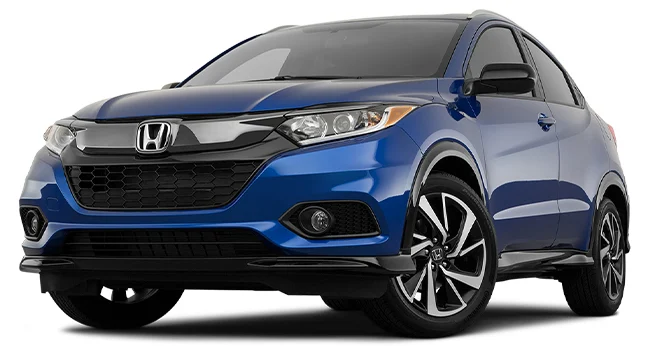
This compact SUV makes a great city car when you still need space for passengers and pets. It's easy to maneuver and comes with a huge range of features across its four trim levels. The base 2019-2020 LX model comes standard with two-wheel drive, but all-wheel drive is available across all trims. The Sport model from 2019-2020 adds a number of premium features, including a leather-wrapped steering wheel, driver aids, and much more. There's also a top of the line Touring trim that adds exterior details, more technology features, and HD Radio™.
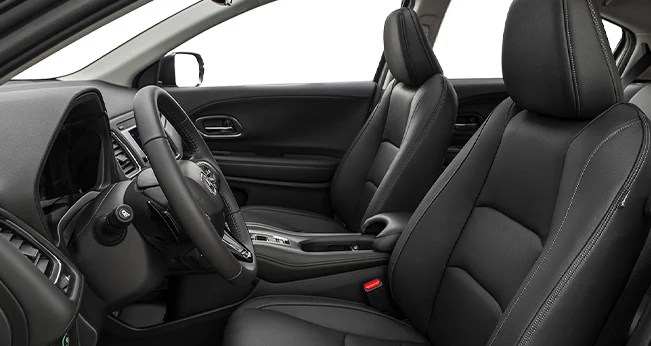
Here's what you can expect on all 2019-2020 Honda HR-V models:
Bluetooth® capability
Multi-angle rearview camera with guidelines
Apple CarPlay® and Android Auto™ integration (from Sport trim)
Honda Sensing® driver-assistance suite (from EX trim)
Rear privacy glass (from EX trim)
Heated front seats (from EX trim)
Honda CR-V
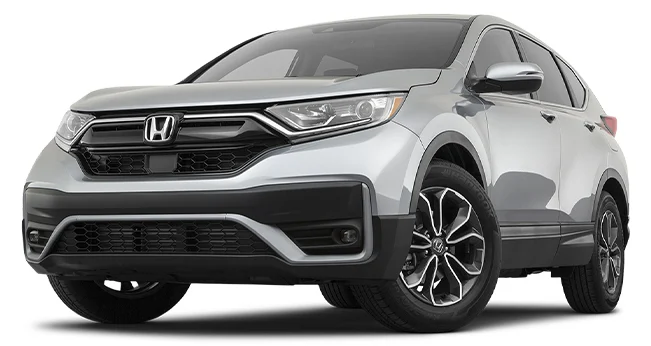
This crossover SUV comes standard with two-wheel drive, but all-wheel drive is available across the four trim levels on 2017-2020 models. From 2017 you'll find the base LX trim, the mid-range EX and EX-L models, and the top-end Touring trim. The 2017-2020 base model is well-equipped, but if you're looking for driver-assistance features, shop for EX trims and higher. The Touring trim builds on the features of the EX trims and adds satellite navigation, so aim for the Touring if you regularly take long journeys or road trips.
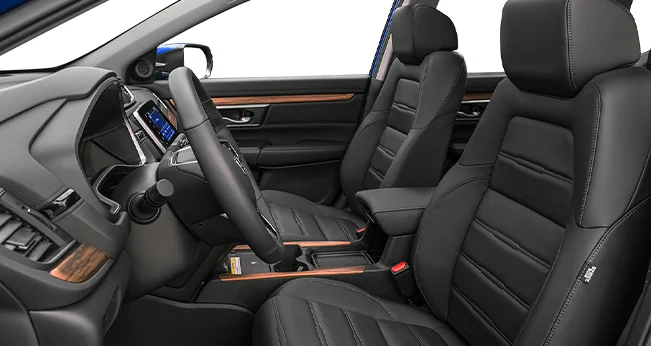
Here's what to expect across the Honda CR-V's trim levels from 2019-2020:
Multi-angle rearview camera
Remote entry system
Bluetooth capability
USB audio interface
Lane-keeping assist (from EX trim)
Power moonroof with tilt feature (from EX trim)
Apple CarPlay and Android Auto integration (from EX trim)
Honda Passport
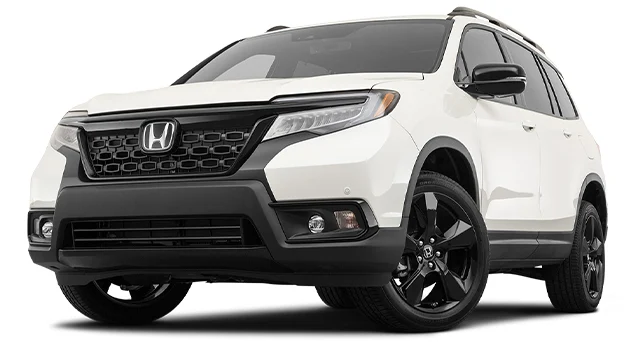
As the newest SUV in the Honda lineup, the Passport is packed with the latest features and conveniences. Two-wheel drive is standard, but with the available all-wheel drive this SUV shines as a capable adventurer. The 2019 model is based on Honda's unibody truck platform, making it supremely rugged. The trim levels start with the base Sport model and climb to EX-L, Touring, and Elite. Many of the tech and driver-assistance features start at the EX-L trim, with luxury features reserved for the Elite level.
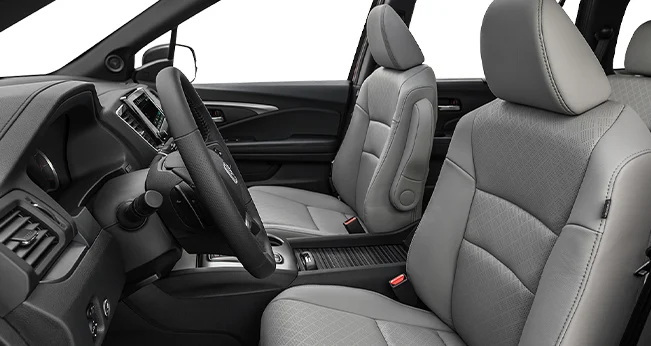
Here's what you can expect across the different trims of the 2019-2020 Honda Passport:
Lane-keeping assist
Adaptive cruise control
Bluetooth capability
Forward collision warning
Power liftgate (from EX-L trim)
Sunroof (from EX-L trim)
Leather upholstery (from EX-L trim)
Heated and power-adjustable front seats (from EX-L trim)
Apple CarPlay and Android Auto compatibility (from EX-L trim)
Honda Pilot

The Honda Pilot is very similar to the Passport, but with three rows instead of two. The 2017-2020 models start with the LX trim and climb through the levels to the EX, EX-L, Touring, and Elite trims. You get plenty of standard features on the 2019-2020 base trim, including driver aids, but higher trims add more high-end features. Look for the power tailgate on the EX-L trim and upward, and the heated and ventilated seats on Elite models.

Here's what to expect from 2019-2020 Honda Pilot models:
Rearview camera
Lane-keeping assist
Adaptive cruise control
Frontal collision warning with automatic braking
Heated front seats (from EX trim)
Slide-and-fold second-row seats (from EX trim)
Eight-inch touchscreen (from EX trim)
10-speaker premium audio system (from Touring trim)
Engine Options
Honda keeps its engine options simple across its SUV lineup. The 2017-2020 Honda HR-V has just one engine across all trims: a 1.8L i-VTEC® four-cylinder that produces 141 hp.
The 2017-2020 CR-V comes with more choices. You'll get a standard 2.4L four-cylinder engine on LX trims, but there's a 1.5L turbocharged engine on the EX, EX-L, and Touring trims. The 2.4L engine puts out 184 hp; the turbo is slightly more powerful, with 190 hp.
The Honda Passport keeps things simple with a 3.5L V6 engine as standard across all 2019-2020 models. It pumps out 280 hp, adding to the SUV's rugged credentials.
The 2019-2020 Honda Pilot has just one engine available—the same 3.5L V6 it shares with the Passport. Just like its smaller sibling, the Pilot provides a power output of 280 hp.
Fuel Economy
You'll find decent fuel economy across all four vehicles. The two smaller SUVs—the HR-V and CR-V—do a little better on mpg, thanks to their size.
2019 Honda HR-V
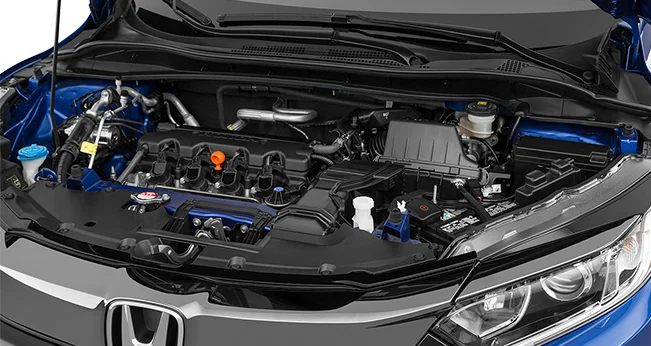
With the 1.8L engine, two-wheel-drive models get an EPA-estimated 30 mpg combined.1
With the 1.8L engine, all-wheel-drive LX models get an EPA-estimated 29 mpg combined.1
With the 1.8L engine, all-wheel-drive Sport models and above get an EPA-estimated 28 mpg combined.1
2019 Honda CR-V
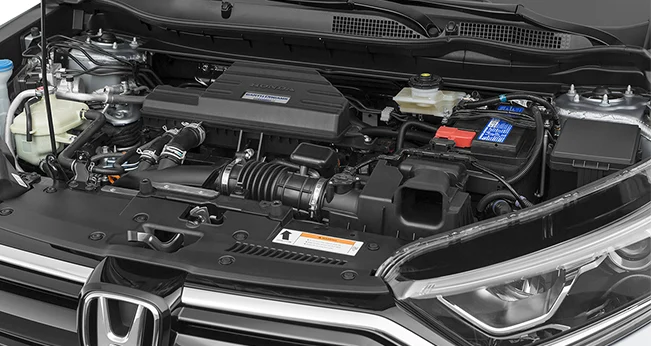
With the 2.4L engine, front-wheel-drive models get an EPA-estimated 38 mpg combined.1
With the 2.4L engine, all-wheel-drive models get an EPA-estimated 27 mpg combined.1
With the 1.5L engine, front-wheel-drive models get an EPA-estimated 30 mpg combined.1
With the 1.5L engine, all-wheel-drive models get an EPA-estimated 29 mpg combined.1
2019 Honda Passport
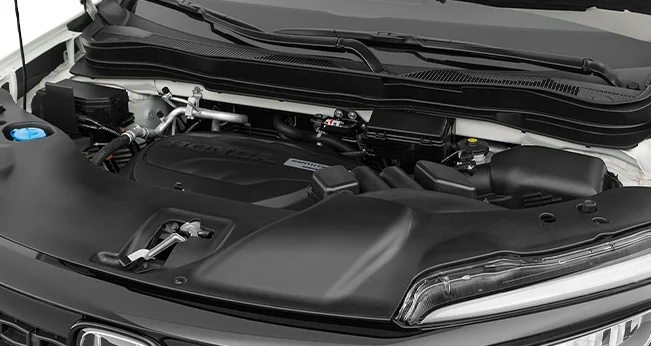
With the 3.5L engine, front-wheel-drive models get an EPA-estimated 22 mpg combined.1
With the 3.5L engine, all-wheel-drive models get an EPA-estimated 21 mpg combined.1
2019 Honda Pilot
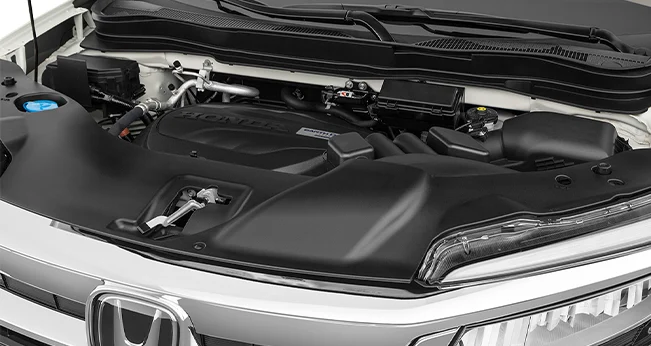
With the 3.5L engine and nine-speed automatic transmission, front-wheel-drive models get an EPA-estimated 23 mpg combined.1
With the 3.5L engine and six-speed automatic transmission, front-wheel-drive models get an EPA-estimated 22 mpg combined.1
With the 3.5L engine and nine-speed automatic transmission, all-wheel-drive models get an EPA-estimated 22 mpg combined.1
With the 3.5L engine and six-speed automatic transmission, all-wheel-drive models get an EPA-estimated 21 mpg combined.1
Tech Features
All Honda SUVs benefit from a range of tech features. While the base models are relatively well-equipped, jump to the second trim level to enjoy added driver aids and features. Here's what you can find across the different trim levels of each SUV.
2019 Honda HR-V
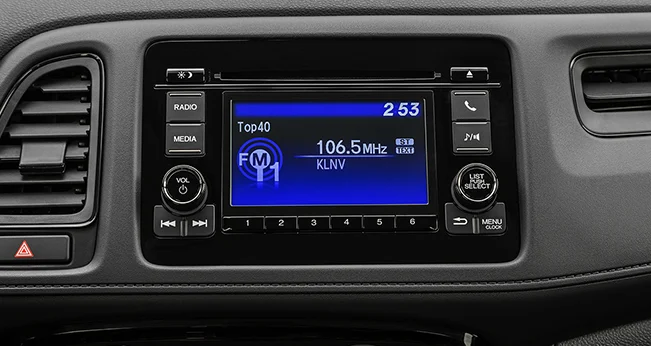
Five-inch color display screen
Bluetooth capability
Multi-angle rearview camera with guidelines
Two 12V power outlets
Apple CarPlay and Android Auto integration (from Sport trim)
Honda Sensing driver-assistance suite (from EX trim)
2019 Honda CR-V
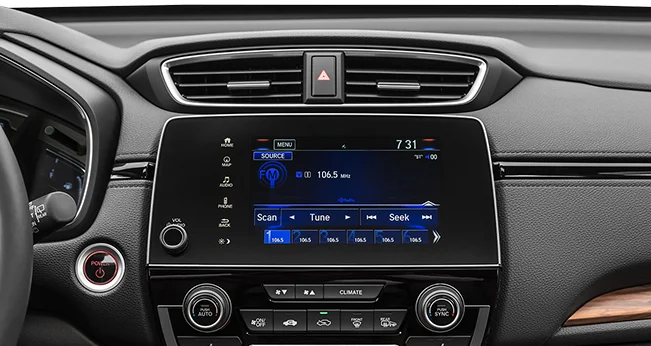
Multi-angle rearview camera
Remote entry system
Bluetooth capability
USB audio interface
Lane-keeping assist (from EX trim)
Apple CarPlay and Android Auto integration (from EX trim)
2019 Honda Passport
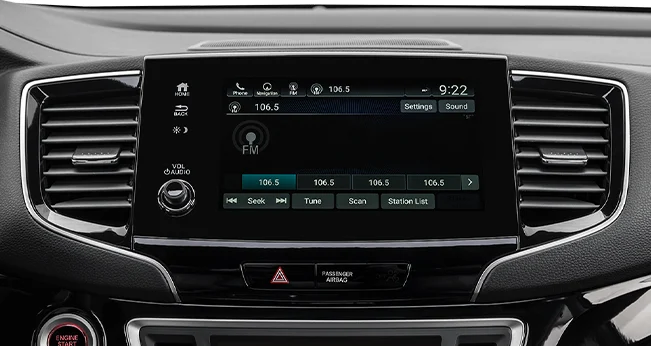
Lane-keeping assist
Keyless access and ignition
Adaptive cruise control
Bluetooth capability
Forward collision warning
Apple CarPlay and Android Auto compatibility (from EX-L trim)
Eight-inch touchscreen (from EX-L trim)
2019 Honda Pilot
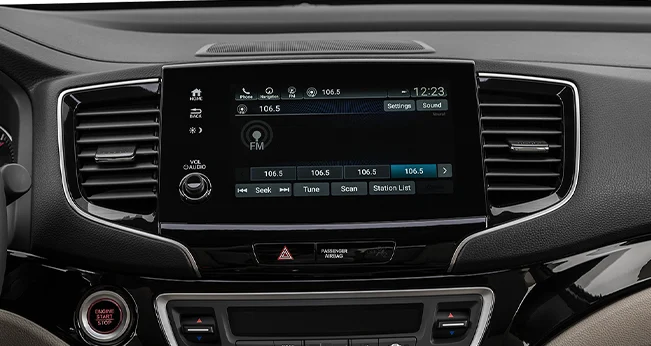
Rearview camera
Lane-keeping assist
Adaptive cruise control
Frontal collision warning with automatic braking
Keyless entry (from EX trim)
Eight-inch touchscreen (from EX trim)
Available Wi-Fi hotspot (from Touring trim)2
10-speaker premium audio system (from Touring trim)
Cargo Space
Even though it's the smallest of the Honda SUV lineup, the HR-V still has impressive cargo space. The 2017-2020 two-wheel-drive models get 24.3 cu ft behind the rear seats and 58.8 cu ft behind the front row. This is reduced in all-wheel-drive models, to 23.2 and 57.6 cu ft, respectively. No matter which model you choose, you've still got plenty of space for your passengers and their things, as well as for trips to the home improvement store.
The 2017-2020 CR-V is a little more spacious, with 39.2 cu ft behind the rear seats and 75.8 cu ft with all seats folded. This makes it a practical choice if you're regularly transporting sporting gear or camping supplies.
The 2019-2020 Honda Passport is bigger still, with 41.2 cu ft behind the rear seats and 77.7 cu ft with all seats folded. Go for the Passport if you want a little more flexibility with your cargo space for impromptu trips and pick-ups.
For maximum space, the three-row 2017-2020 Honda Pilot offers 16.5 cu ft behind the third row, 46.8 cu ft behind the second, and a whopping 83.8 cu ft with all rows folded. This is the one to go for if you need a lot of room for bags, ski gear, or even a bicycle.
Pricing
See below for average CarMax prices for various model years of all four Honda SUVs.3
Honda HR-V
2016 - Average prices less than $16,5003
2017 - Average prices less than $18,0003
2018 - Average prices less than $18,5003
2019 - Average prices less than $21,0003
2020 - Average prices less than $21,5003
Honda CR-V
2016 - Average prices less than $19,0003
2017 - Average prices less than $22,5003
2018 - Average prices less than $24,0003
2019 - Average prices less than $26,0003
2020 - Average prices less than $28,0003
Honda Passport
Honda Pilot
2016 - Average prices less than $24,5003
2017 - Average prices less than $27,5003
2018 - Average prices less than $29,5003
2019 - Average prices less than $32,5003
2020 - Average prices less than $36,5003
Emissions
EPA estimates for tailpipe greenhouse gas emissions vary among Honda SUV models and trims. See below for details.
2019 Honda HR-V
EPA-estimated 292 grams per mile for 2WD models
EPA-estimated 311 grams per mile for AWD models with CVT
EPA-estimated 314 grams per mile for AWD models with seven-speed automatic transmission
2019 Honda CR-V
EPA-estimated 312 grams per mile for FWD models with 2.4L engine
EPA-estimated 328 grams per mile for AWD models with 2.4L engine
EPA-estimated 292 grams per mile for FWD models with 1.5L engine
EPA-estimated 302 grams per mile for AWD models with 1.5L engine
2019 Honda Passport
EPA-estimated 407 grams per mile for FWD models with 3.5L engine
EPA-estimated 427 grams per mile for AWD models with 3.5L engine
2019 Honda Pilot
EPA-estimated 388 grams per mile for FWD models with 3.5L engine and nine-speed automatic transmission
EPA-estimated 405 grams per mile for FWD models with 3.5L engine and six-speed automatic transmission
EPA-estimated 408 grams per mile for AWD models with 3.5L engine and nine-speed automatic transmission
EPA-estimated 421 grams per mile for AWD models with 3.5L engine and six-speed automatic transmission
These estimates are based on a brand-new model. Visit fueleconomy.gov for more details.
The Bottom Line
Deciding which Honda SUV is right for you comes down to your needs. If you're looking for maximum people-moving and cargo-hauling ability, the Honda Pilot may be right for you. For those with an adventurous spirit, the Honda Passport fills the midsize SUV gap nicely. If you need something a little smaller that still has plenty of cargo space, either the HR-V or CR-V may suit you—especially for around-town errands.
Need further inspiration? Check out these related articles:
